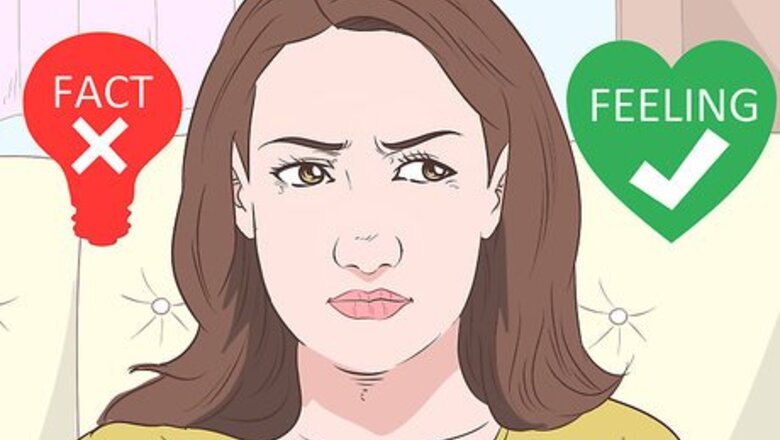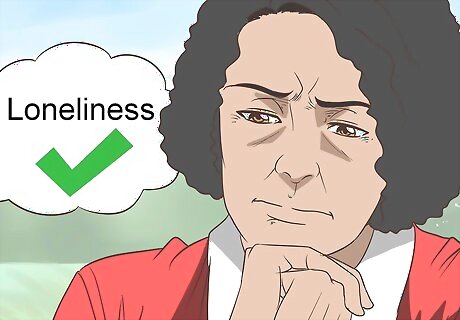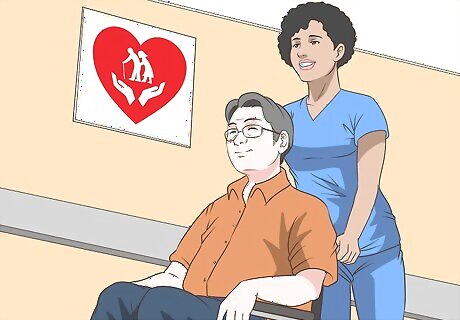
views
X
Research source
Loneliness can affect our mental, emotional, and physical health by suppressing the immune system, increasing the risk for depression and anxiety, and distorting our perceptions.[2]
X
Research source
You may feel lonely if you live in a small town and can’t find friends your age. Sometimes loneliness is the result of recent life changes: a recent move to a new city, landing a new job, or attending a new school. When in the midst of big changes, realize that you may feel lonely for a moment. Whether loneliness is experienced for a short term or chronically, there are plenty of things you can do to become more at peace and work through feelings of loneliness.
Coping with Loneliness

Accept that loneliness is not a fact, but a feeling. Loneliness can trigger feelings of abandonment, forlornness, or isolation. Recognize when these emotions are triggered, and remember that having a feeling doesn’t necessarily make it fact. You are not bound to feeling lonely. Feelings can change quickly based on circumstances and attitudes. All these feelings are perhaps like bubbles in a pond which come and go. You may feel lonely one moment, then realize that you’d rather be by yourself than be with friends, or you may receive a phone call from a friend, relieving loneliness.

Embrace your feelings. Don’t ignore your feelings; they can be important signals on what is going well or poorly in your life. As with all feelings, allow yourself to feel loneliness. Pay attention to how you feel when loneliness creeps up. Your body may feel heavy, or you may have an urge to cry. Allow yourself to feel the physical and emotional associations, and allow yourself to cry. Don’t instinctively run from loneliness. Many people choose to distract themselves from loneliness by turning to T.V, work, projects, or other activities to avoid feeling the pain of loneliness. Instead, stay aware of your feelings (and the ways you cope) and determine to honor your body and emotions. Discard ignorance accept that you are lonely and try to find a solution, analyze your own self.

Change your attitude. When the thoughts “I’m lonely” or “I feel all alone” come across your mind, chances are you have a negative association with these feelings. It’s easy to spiral into negative thoughts from here: questioning your self-worth, feeling somehow less valuable or feeling emotionally or physically drained. Before heading down this rabbit hole, consider changing your attitude. Instead of labelling your experience as “lonely”, adopt the mindset of having solitude. Embrace having the opportunity to experience solitude as peaceful and restorative. When you learn to cherish your solitude you'll be able to handle the times when it’s just you. Use your time to get to know yourself better: start a journal, meditate, and read books that interest you. Sometimes having more alone time is inevitable, such as when moving to a new city or country. Embrace the moments you have to experience solitude, and know that they will not last forever. Cherish the time you have to have a new experience.

Practice compassion. Realize that loneliness is a universal experience that affects every individual at one time or another. Loneliness is part of the human experience. Imagine having a friend tell you that she feels lonely. How would you respond? What would you say to her? Practice this same compassion toward yourself. Allow yourself to reach out to people and ask for support. Loneliness is not shameful or embarrassing; it is a part of everyone’s life at some point, and there’s no need to feel bad about feeling lonely. Express compassion toward yourself, and express compassion toward other people who may feel lonely around you.

Question what may be missing from your life. Loneliness can be a tool to show you what may be missing or what you may want more of in your life. You may be surrounded by people and social events yet still feel lonely. Loneliness may not be a lack of social contact, but a lack of intimate connections. Take some time to reflect upon what you would like to have in your life. Write down times when you feel lonely. Maybe you feel most lonely during large social events or when you are home alone. Then, consider what might alleviate that loneliness; maybe it would be having a friend go to events with you, or calling over your sister to watch a movie when you feel lonely at home. Come up with realistic solutions that you can enact (don’t make the solution to have a boyfriend or girlfriend to solve all of your loneliness).

Overcome shyness and insecurity. Remember that nobody is born with social skills, and that they are skills, not superpowers. Much of shyness/insecurity comes from false beliefs or fears about social performance. Your thoughts about being unlikeable or weird do not reflect reality; it is one perception. And remember, you don't have to be perfect in order to be likeable. When you feel socially insecure, start paying more attention to your external environment instead of your internal thoughts and feelings. Focus on the person/people you are talking to, and focus your attention on understanding and hearing out your company instead of yourself. Realize that it’s okay to make social mistakes; everybody does! People pay a lot less notice to your mistakes than you realize; most people are too focused on themselves and combatting social fears to notice your insecurities! For more information, read How to Not Be Shy.

Conquer your fear of rejection. Sometimes, it feels safer to avoid social situations than to experience rejection. A fear of rejection is based in a distrust in people. Perhaps you experienced betrayal in the past and are now fearful in trusting people or making friends. While this experience was painful, remember that not every friendship you have will betray you. Keep trying. Not every rejection you experience reflects a rejection of you as a person. Someone may be distracted or unaware of you reaching out. Remember that you don’t like everyone you meet, and not everyone you meet will like you, and that's okay.
Reaching Past Loneliness

Build your social skills. Perhaps you feel lonely because you don’t feel confident in your social skills. Practice social skills such as smiling at other people, giving compliments, and making conversation with people you meet throughout the day (grocery clerk, barista, co-workers). If you’re in a new situation, reach out to someone else and start a conversation. Say “I’ve never been here before, have you? What’s it like?” Either the person can help you or you can find comfort in doing something new together. Remember to communicate openness through body language. By hunching your shoulders, looking down, avoiding eye contact and crossing your body, you appear unapproachable. Smile, keep your posture open (uncross your legs or arms), lean in, and face the person who is speaking. Look for things to affirm in others. Don’t just compliment someone’s appearance ("I like your sweater"), but instead say "You always take the time to put together just the right accessories." If you know someone well enough, compliment them on their kindness or intelligence. Learn more ways to improve your social skills more by checking out How to Improve Social Skills.

Be a good listener. Interacting with other people isn’t just about knowing the right thing to say. Hone your listening skills by giving your full attention to the person speaking. Don’t try and plan the perfect response or wait to find your entry point; this puts the focus on you and not the person speaking. Instead, encourage the person to keep talking and show interest in what is being said. Non-verbally communicate your listening skills by nodding your head, making eye contact, and giving small feedback like saying, “I see,” or, “uh huh.” For more tips on how to build listening skills, check out How to Be a Good Listener.

Meet people in your community. Find people with whom you have common interests and with whom you can get along. Ask questions to get to know someone (ask about family, pets, interests, etc.), and make sure people want to get to know you back by asking questions of you. Meet people by volunteering. If you love animals, volunteer at an animal sanctuary or an animal shelter. You’re bound to meet other people who love animals and you have something immediately connecting you. Find common interest groups in your community. If you are interested in knitting, chances are there are people around you that also share that interest. Do a little internet research and find a group that you can join. Want more information on how to make friends? Check out How to Make Friends.

Make good friends. It’s important to have solid friendships in the town where you live. Friendships help boost your mood, reduce stress, and give you lifelong support. Look for friends that you trust, are loyal, and encourage you. And make sure you live out the values you look for in a friend, too, by being a trusting, loyal, and encouraging person to the friends in your life. Be genuine. if you cannot "be yourself’ around your friends, chances are they are not your friends. Friends will appreciate you for you, quirks and all. If you struggle to connect with one person or feel like you are trying too hard, move on and make a new friend. Practice being the friend you want to have. Think about the qualities you want in a friend, and do those things for the people in your life.

Adopt a pet. Adopting a dog or cat (or other pet) from an animal shelter can mean major health benefits for you, especially companionship. Humans that have dogs tend to have lower levels of depression, are able to cope with stress better, and show lower levels of anxiety. Go to the local animal shelter and help to socialize a dog or cat that has lost their family and is alone. If you are able, you may wish to adopt a dog. Of course, adopting a dog is a big responsibility. Make sure you can adjust your schedule around a new pet in order to give your pet a loving and fulfilling life.

Engage in therapy. Sometimes the pain of loneliness can take a toll and make it difficult to move forward on your own. A therapist can help you work through social anxiety, understand past feelings of betrayal and distrust, improve your social skills, and offer support in moving forward. Reaching out to a therapist can be an empowering first step in committing to the life you want for yourself. For more information, check out How to Choose a Therapist.



















Comments
0 comment